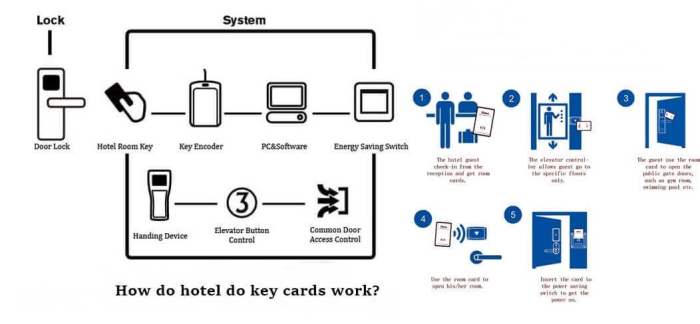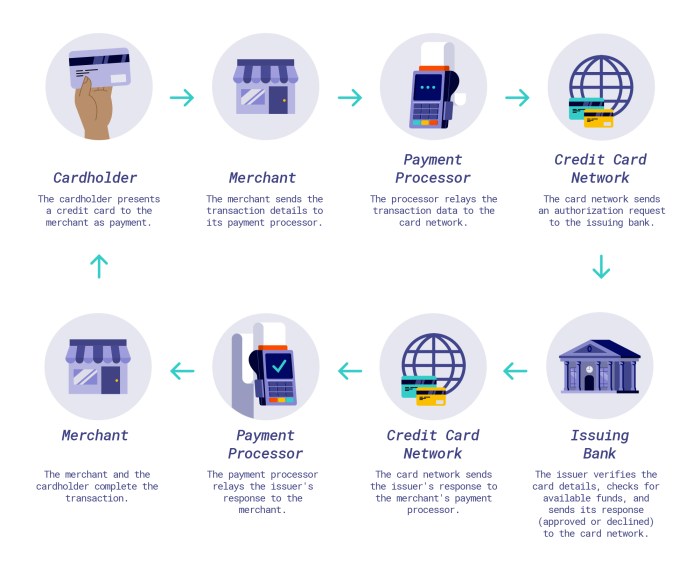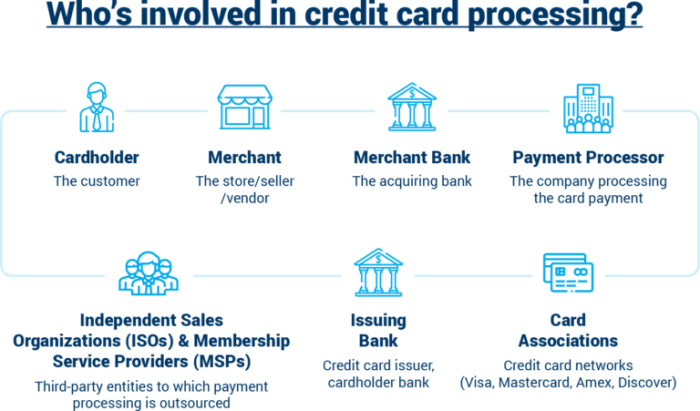How do hotel cards work credit – How do hotel credit cards work? Understanding the intricacies of hotel credit cards can unlock significant travel savings and perks. These cards offer a compelling blend of rewards programs, exclusive benefits, and financing options tailored to frequent travelers. From earning points on everyday spending to redeeming them for luxurious hotel stays and upgrades, hotel credit cards provide a pathway to elevate your travel experiences.
This guide will delve into the various types of cards, their reward structures, associated fees, and the application process, empowering you to make informed decisions.
The world of hotel credit cards is diverse, encompassing co-branded cards offering loyalty points within specific hotel chains, and general travel rewards cards that include hotel partnerships as part of their broader rewards ecosystem. Each card type presents a unique set of advantages and disadvantages regarding annual fees, earning rates, and redemption options. Understanding these nuances is crucial for maximizing the value proposition of these financial tools.
Types of Hotel Credit Cards

Hotel credit cards offer a variety of ways to earn rewards and enjoy perks when traveling. Understanding the different types available helps you choose the card that best suits your needs and travel style. The primary categories are co-branded cards and general travel rewards cards with hotel partnerships.
Co-Branded Hotel Credit Cards
Co-branded hotel credit cards are issued in partnership with a specific hotel chain or loyalty program. These cards often provide the most significant benefits within the partner hotel’s ecosystem. Benefits typically include bonus points on spending at the partner hotel, automatic elite status, and complimentary perks such as free night certificates or room upgrades.
For example, a Marriott Bonvoy card might offer bonus points earned on all purchases, accelerated points earning at Marriott hotels, complimentary night certificates after spending a certain amount, and automatic Silver Elite status in the Marriott Bonvoy program. A Hilton Honors card may provide similar benefits, but tailored to Hilton properties and its Honors loyalty program. The annual fee varies greatly depending on the card and its perks, ranging from free to several hundred dollars annually.
General Travel Rewards Cards with Hotel Partnerships
General travel rewards cards offer broader earning potential across various spending categories, but also often include partnerships with specific hotel chains. While they may not offer the same level of exclusive benefits as co-branded cards, they provide flexibility in how you redeem your rewards. You can redeem points or miles for stays at various partner hotels, flights, or other travel expenses.
A card like the Chase Sapphire Preferred Card, for example, is a general travel rewards card with a robust points program that partners with several hotel chains through its transfer partners. This allows cardholders to transfer points to hotel loyalty programs, potentially earning a bonus for doing so. While it doesn’t offer automatic elite status or free night certificates tied directly to a specific hotel brand, its flexibility in rewards redemption makes it appealing to travelers who stay at multiple hotel chains.
Comparison of Annual Fees and Rewards Programs
The annual fees and rewards programs of hotel credit cards vary considerably. Co-branded cards frequently have higher annual fees, often reflecting the value of the included benefits like complimentary nights or elite status. However, these benefits can offset the annual fee for frequent guests of the partner hotel. General travel rewards cards with hotel partnerships typically have lower annual fees or no annual fee, but their rewards may not be as directly beneficial for hotel stays.
Consider a comparison between a premium co-branded card with a $95 annual fee and a free general travel rewards card. The premium card might offer a free night certificate worth $200 and automatic elite status, which translates to significant savings for a frequent guest of that hotel chain. The free card might offer a lower earning rate for hotel stays but could be more beneficial for travelers who use their card for everyday spending and redeem points for various travel options.
| Card Type | Annual Fee | Rewards | Example |
|---|---|---|---|
| Co-Branded (Premium) | $95 – $500+ | Bonus points on hotel spending, elite status, free nights, room upgrades | Marriott Bonvoy Boundless Credit Card |
| Co-Branded (Basic) | $0 – $95 | Bonus points on hotel spending, potentially some elite status benefits | IHG Rewards Club Premier Credit Card |
| General Travel Rewards (with hotel partnerships) | $0 – $500+ | Points redeemable for hotel stays, flights, and other travel expenses | Chase Sapphire Preferred Card |
Earning Rewards Points

Hotel credit cards offer a compelling way to earn rewards points, ultimately reducing the cost of your travels. The earning potential varies significantly depending on the specific card and your spending habits. Understanding how these points accumulate is crucial to maximizing your return on investment.Earning rewards points typically involves spending on your hotel credit card. The more you spend, the more points you accrue.
However, many cards offer bonus categories, where you earn accelerated points for spending in specific areas like dining, groceries, or even at partner airlines. These bonus categories, along with welcome bonuses, significantly impact the overall points accumulation.
Point Earning Rates and Bonus Categories
Many hotel credit cards offer a base earning rate for everyday spending, typically expressed as points per dollar spent. For example, a card might offer 1 point per dollar spent on all purchases. However, bonus categories significantly enhance earning potential. Spending in these bonus categories could yield 2, 3, or even more points per dollar. For instance, a card might offer 3x points on dining and 2x points on groceries, effectively accelerating your point accumulation in these areas.
To maximize your points, prioritize spending on your credit card in these bonus categories whenever possible.
Maximizing Point Accumulation, How do hotel cards work credit
Strategically using your hotel credit card can dramatically increase your point earnings. Consider consolidating your spending, concentrating purchases within bonus categories to maximize the bonus points earned. For example, using your card for groceries, dining, and even everyday purchases like gas, if those fall under bonus categories, allows for quicker accumulation of points. Planning larger purchases, such as flights or car rentals, around bonus periods or promotions further amplifies your rewards.
Some cards offer bonus point promotions throughout the year; taking advantage of these targeted offers can significantly boost your overall point balance.
Comparison of Prominent Hotel Credit Cards
The following table compares the point earning rates and annual fees of several popular hotel credit cards. Note that these rates and fees are subject to change, so it’s always best to check the issuer’s website for the most up-to-date information.
| Card Name | Earning Rate (Base) | Bonus Categories | Annual Fee |
|---|---|---|---|
| Marriott Bonvoy Boundless® Credit Card | 2x points on Marriott purchases, 1x point on other purchases | Marriott Hotels, Restaurants, Flights booked through Marriott | $95 |
| Hilton Honors American Express Aspire Card | 12x points on Hilton purchases, 1x point on other purchases | Hilton Hotels, Resorts | $450 |
| IHG® Rewards Club Premier Credit Card | 2x points on IHG purchases, 1x point on other purchases | IHG Hotels, Restaurants | $99 |
| World of Hyatt Credit Card | 2x points on Hyatt purchases, 1x point on other purchases | Hyatt Hotels, Restaurants, Flights booked through Hyatt | $95 |
Redeeming Rewards Points

Redeeming your accumulated hotel credit card points can unlock a range of valuable travel perks, transforming your next getaway into a more rewarding experience. Understanding the various redemption options and their relative value is crucial to maximizing your points’ potential. This section will explore the different ways you can use your points and help you make informed decisions about how to best utilize your rewards.Redeeming points for hotel stays offers flexibility and significant savings.
The value you receive will depend on the specific program, the time of year, and the hotel’s location and popularity. It’s important to compare the point cost of a stay with its cash equivalent to ensure you are getting the best possible return on your points.
Redemption Options for Hotel Stays
Hotel credit card reward programs typically offer several ways to redeem your points. These options often include free nights, room upgrades, and other valuable benefits, allowing you to customize your redemption to suit your travel needs and preferences. Some programs may even offer the option to combine points with cash to cover a portion of the cost.
Point Value and Cash Equivalents
The value of a reward point varies significantly between programs. Some programs might value a point at $0.01, while others might offer a value closer to $0.02 or even higher, depending on the redemption method and the specific hotel. To determine the value of your points, compare the point cost of a reward night to the cash price of the same room.
For example, if a room costs $200 and requires 20,000 points, the point value is $0.01 per point ($200/20,000). It’s essential to track these values over time to understand the best opportunities for redemption.
Hypothetical Redemption Scenario
Let’s imagine Sarah has accumulated 40,000 points on her hotel credit card. She’s planning a weekend trip to New York City in October. She checks the hotel’s website and finds a standard room at the “Grand Hotel NYC” costs $300 per night for a two-night stay ($600 total). The hotel’s rewards program allows redemption of 20,000 points per night.
Sarah decides to redeem 40,000 points for a two-night stay, effectively saving $600. In this scenario, each point is worth $0.015 ($600/40,000). However, if she booked during peak season, the cash price might be higher, increasing the value of her points. Conversely, booking during the off-season might reduce the value. She also considers the possibility of using points for an upgrade to a suite, evaluating the point cost against the upgrade fee to determine the best value.
Hotel Card Benefits Beyond Points

Hotel credit cards offer a wealth of benefits beyond the valuable rewards points they accrue. These additional perks can significantly enhance your travel experience, often providing substantial value that extends far beyond the cost of the annual fee. Understanding these benefits is key to maximizing the return on your hotel credit card investment.Many hotel credit cards provide a suite of supplementary services designed to improve convenience and peace of mind during your travels.
These can include complimentary access to airport lounges, comprehensive travel insurance coverage, and discounts on car rentals. These extras add up to a considerable advantage for frequent travelers.
Airport Lounge Access
Airport lounges offer a haven of comfort and convenience amidst the often chaotic environment of airports. Cardholders frequently receive complimentary access to airport lounges worldwide through partnerships with networks like Priority Pass or individual airline lounges. This benefit provides a quiet space to relax before a flight, often including complimentary food and beverages, comfortable seating, and high-speed Wi-Fi.
For example, a cardholder might enjoy a pre-flight meal and a quiet workspace in a United Club lounge before a long international flight, avoiding the crowded gate area. This can significantly reduce stress and improve the overall travel experience.
Travel Insurance
Travel insurance offered by hotel credit cards typically covers trip cancellations, lost luggage, and medical emergencies. The specifics vary depending on the card, but this coverage can provide substantial financial protection. For instance, if a flight is cancelled due to unforeseen circumstances, the card’s travel insurance might reimburse the cost of the cancelled tickets and rebooking fees. Similarly, coverage for lost or damaged luggage can significantly alleviate the stress and expense of replacing essential items.
The peace of mind this insurance provides is invaluable, especially for international travel.
Rental Car Discounts
Many hotel credit cards offer discounts on rental car bookings through partnerships with major rental companies. These discounts can range from a percentage off the daily rate to complimentary upgrades or additional benefits. For example, a cardholder might receive 15% off their rental car booking, or a free upgrade to a larger vehicle. These savings can accumulate quickly, particularly for those who frequently rent cars for business or leisure travel.
Combined with the other benefits, these rental car discounts contribute to a more cost-effective and enjoyable travel experience.
Understanding Fees and APR: How Do Hotel Cards Work Credit

Hotel credit cards, while offering enticing rewards, come with associated fees and interest rates that significantly impact their overall cost. Understanding these financial aspects is crucial for making an informed decision and maximizing the benefits while minimizing expenses. This section will clarify the different types of fees and the implications of the Annual Percentage Rate (APR).
Types of Hotel Credit Card Fees
Hotel credit cards typically involve several types of fees. Knowing these fees beforehand allows for a more accurate assessment of the card’s true cost. Failing to account for these fees can lead to unexpected expenses and negate the perceived value of the rewards program.
- Annual Fee: Many premium hotel credit cards charge an annual fee for membership. This fee can range from a modest amount to several hundred dollars, depending on the card’s perks and benefits. Consider whether the benefits outweigh the annual cost.
- Foreign Transaction Fees: These fees are charged when using the card for purchases in foreign currencies. The percentage charged varies across cards, with some offering no foreign transaction fees, making them ideal for international travelers. Cards without this fee can result in significant savings on international spending.
- Late Payment Fees: Missing a payment deadline will usually result in a late payment fee. These fees can be substantial and add to the overall cost of the card. Consistent and timely payments are essential to avoid these charges.
- Balance Transfer Fees: Transferring a balance from another credit card might incur a fee, typically a percentage of the transferred amount. Carefully evaluate the benefits of a balance transfer against the associated fees.
- Cash Advance Fees: Withdrawing cash using your credit card (a cash advance) usually comes with a higher fee and interest rate than regular purchases. Cash advances should be avoided unless absolutely necessary.
Annual Percentage Rate (APR) and Its Implications
The APR represents the annual interest rate charged on outstanding balances. A higher APR means a greater cost for carrying a balance. Understanding the APR is crucial for managing expenses and avoiding accumulating debt. Failing to pay your balance in full each month will result in interest charges, increasing the overall cost.
The APR is calculated based on several factors, including your creditworthiness and the card’s terms.
Understanding the APR and its impact is essential for responsible credit card usage. Paying off your balance in full each month will eliminate interest charges entirely.
APR and Fee Structure Comparison
Comparing the APR and fee structures of several hypothetical hotel credit cards illustrates the potential cost differences.
| Card | Annual Fee | APR | Foreign Transaction Fee |
|---|---|---|---|
| Luxury Hotel Rewards Card | $450 | 19.99% | 3% |
| Mid-Tier Hotel Rewards Card | $95 | 16.99% | 0% |
| No-Annual-Fee Hotel Rewards Card | $0 | 22.99% | 2.5% |
Note: These are hypothetical examples and actual APRs and fees can vary. Always check the specific terms and conditions of any credit card before applying. The table highlights how a higher annual fee might be offset by a lower APR and the absence of foreign transaction fees, making it more cost-effective for certain users. Conversely, a card with no annual fee may end up costing more due to a higher APR and foreign transaction fees.
Application Process and Eligibility

Securing a hotel credit card involves a straightforward application process, but your eligibility hinges on several factors. Understanding these factors and the application steps can significantly improve your chances of approval. The process typically involves a credit check and the submission of personal information.The application process for a hotel credit card is similar to that of other credit cards.
Lenders assess your creditworthiness to determine the risk of extending credit. This involves a review of your credit history, income, and debt levels. Factors such as your credit score, income, employment history, and existing debt significantly influence the approval decision. A higher credit score generally increases your likelihood of approval and may also result in a better interest rate and credit limit.
Required Information and Credit Checks
Applicants are typically required to provide personal information such as their full name, address, date of birth, Social Security number, and employment details. The application will also ask about your income and existing debts. Crucially, the issuer will perform a hard credit check, which temporarily lowers your credit score. This check assesses your credit history, looking at factors like payment history, credit utilization, and length of credit history.
A strong credit history with a high credit score is essential for approval. A low credit score might result in denial or an offer with less favorable terms.
Factors Influencing Eligibility
Several factors influence your eligibility for a hotel credit card. These include your credit score, income, employment history, and existing debt. A high credit score (generally above 700) significantly increases your chances of approval. A consistent income stream, demonstrating your ability to repay the debt, is also vital. A stable employment history provides assurance to the lender regarding your financial stability.
High levels of existing debt may negatively impact your application, as it indicates a higher level of financial risk. The type of hotel credit card you apply for can also influence eligibility; premium cards often require higher credit scores and income levels.
Step-by-Step Application Guide
The application process typically follows these steps:
- Locate a suitable card: Research different hotel credit cards, comparing their benefits, rewards programs, and annual fees to find one that aligns with your needs and spending habits. Consider factors such as the welcome bonus, ongoing rewards rate, and any associated perks.
- Pre-qualify (optional): Some issuers allow you to pre-qualify without impacting your credit score. This provides an indication of your chances of approval before submitting a full application.
- Complete the application: Carefully fill out the online application form, ensuring all information is accurate and complete. Double-check your details before submitting.
- Await approval: The issuer will review your application and conduct a credit check. The approval process can take several days or even weeks.
- Review the terms: Once approved, carefully review the terms and conditions of the card, including the APR, annual fees, and rewards program rules.
- Activate the card: Once you’ve accepted the terms, activate your card to begin using it.
Tips for Improving Chances of Approval
To increase your chances of approval, ensure your credit report is accurate and up-to-date. Pay down existing debts to lower your credit utilization ratio. Maintain a consistent income and stable employment history. If you have a low credit score, consider improving it before applying for a premium card. Start with a secured credit card or a card with lower credit requirements to build your credit history.
Applying for multiple credit cards in a short period can negatively impact your credit score; avoid doing this.
Illustrative Example: A Weekend Getaway
Let’s imagine a couple, Sarah and John, planning a romantic weekend getaway to a city known for its vibrant culture and fine dining – let’s say Charleston, South Carolina. They decide to utilize Sarah’s hotel credit card to finance their trip and maximize its benefits. This example will demonstrate how strategically using a hotel credit card can lead to significant savings and enhance the overall travel experience.Sarah possesses a premium hotel credit card offering 5 points per dollar spent on eligible purchases at hotels and 2 points per dollar on all other purchases.
The card also provides complimentary airport lounge access and a yearly anniversary night free at participating hotels.
Trip Planning and Booking
Sarah and John first research flights and hotels in Charleston. They find a suitable flight costing $400 (roundtrip for two) and a charming boutique hotel offering a weekend stay for $500. Using Sarah’s credit card, they book both the flights and the hotel stay.
Point Accumulation and Redemption
Booking the hotel stay directly through the hotel’s website or using the hotel’s booking portal (to ensure maximum point accrual) earns them 5 points per dollar spent, resulting in 2,500 points (5 points/dollar
- $500). Their flight purchase, booked through a third-party travel site, earns them 2 points per dollar, totaling 800 points (2 points/dollar
- $400). This brings their total points earned to 3,300.
Associated Costs and Savings
The total cost of their trip before considering the credit card benefits is $900 ($400 for flights + $500 for hotel). However, this is where the value of the credit card comes into play. Let’s assume the hotel’s rewards program offers a redemption rate of 1,000 points per $100. Their accumulated 3,300 points can be redeemed for a $330 credit towards future hotel stays.
Therefore, their initial expenditure is effectively reduced by $330. Furthermore, the complimentary airport lounge access saved them on the cost of purchasing separate lounge passes, typically around $50 per person.
Overall Savings and Benefits
By using Sarah’s hotel credit card, Sarah and John saved a substantial amount. The direct savings from point redemption is $330. Adding the savings from the complimentary airport lounge access ($100 total), their total savings amount to $430, effectively reducing the cost of their weekend getaway to $470 ($900 – $430). Beyond the monetary savings, the complimentary airport lounge access provided a comfortable and convenient experience, allowing them to relax before their flight.
The potential for future free hotel nights adds further long-term value.
Post-Trip Analysis
After their weekend in Charleston, Sarah and John review their credit card statement. They confirm the points earned and the associated redemption value. They also plan for future travel using the remaining points and anticipate utilizing their next anniversary night benefit for a future stay. The entire process, from booking to checkout, highlights the significant financial and experiential benefits of using a strategically chosen hotel credit card.
Final Conclusion
Ultimately, the decision of whether or not to obtain a hotel credit card hinges on your individual travel habits and financial priorities. By carefully weighing the benefits – such as free nights, upgrades, and exclusive perks – against the potential costs – including annual fees and APR – you can determine if a hotel credit card aligns with your needs.
Remember to always use your card responsibly, paying your balance in full each month to avoid accumulating interest charges and maximizing the rewards potential. With careful planning and strategic usage, a hotel credit card can transform your travel experiences, making luxury more attainable.